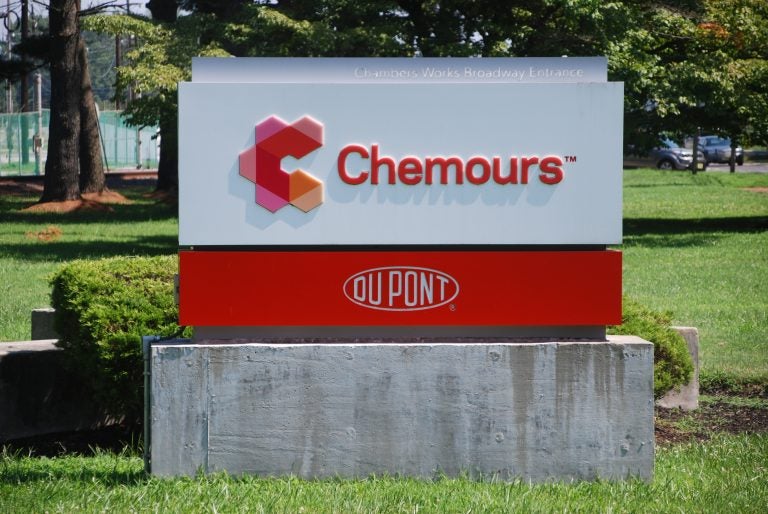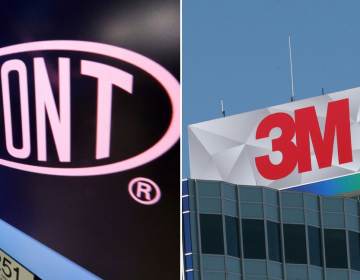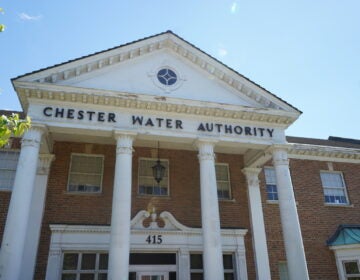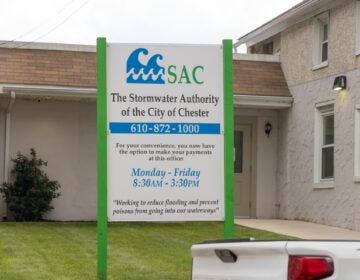DuPont, spinoffs reach $50 million settlement with Delaware over ‘forever chemicals’ pollution
The money will go into a trust fund for remediation such as filtration systems for contaminated water, sampling, and environmental justice grants.

(Jon Hurdle/NJ Spotlight)
The State of Delaware has reached a landmark $50 million settlement with three local chemical giants — DuPont, Chemours, and Corteva — over water pollution and related contamination from the toxic class of compounds known as PFAS.
Also known as “forever chemicals” because they do not break down in the environment, Per- and Polyfluoroalkyl Substances have been around since the 1940s. They include thousands of compounds used in the production of such household and personal items as nonstick (Teflon) cookware, water-repellent clothing, and carpeting, among many others. They also have been used in firefighting foam, which resulted in contaminated drinking water around military bases in Pennsylvania, New Jersey, and elsewhere. Contaminated wells near Dover Air Force Base have been found as well. Exposure is linked to some cancers, as well as high cholesterol and thyroid problems.
State Attorney General Kathy Jennings, whose office negotiated what she called the largest settlement in an environmental damage case, said the money will be put into a trust fund to pay for:
- Purifying drinking water and restoring natural resources, including wildlife habitats, and aquatic resources.
- Environmental sampling and testing to ascertain the presence of PFAS and other contaminants in the ground, water, and air.
- Research and development, with a focus on PFAS detection and abatement technologies.
- Community environmental justice and equity grants, including funding for community health clinics and initiatives in communities located near industrial and manufacturing areas known to be impacted by PFAS contamination.
The three companies, headquartered in Delaware, have also agreed to pay the state an additional $25 million over the next years if similar claims in other states are settled for more than $50 million.
Of the $50 million committed Tuesday, DuPont spinoff Chemours will pay $25 million, and DuPont and Corteva $12.5 million each. Delaware’s settlement was reached before the state filed a lawsuit, but several other states, including New Jersey, have filed cases in court.
“We all need to work collaboratively, fervently, and quickly to restore our natural resources and support our most vulnerable communities,” Jennings said. “Today’s agreement moves us miles ahead in that work.”
She stressed that “the real work still lies ahead, but I am grateful that everyone came to the table to chart a constructive path forward for Delaware, and I commit that our office will keep working to ensure justice — including environmental justice for everyone in this state.”
Despite the pollution that has flowed to the state from the Chambers Works site across the Delaware River near Salem, N.J., and other plants, Gov. John Carney applauded the companies for agreeing to pay up.
“These companies have a long, proud history in our state,’’ Carney said. “This agreement is a natural extension of that legacy and signifies a commitment to continue investing in the quality of life of our citizens and the health of our environment.”
Delaware’s investigation into PFAS pollution remains ongoing and is expected to result in additional recoveries from other parties or enforcement actions, Jennings spokesman Mat Marshall said.
PFAS have been detected in all three Delaware counties and in the Delaware River and Bay, Marshall said, stressing that DuPont, Chemours, and Corteva “have responsibility only for a portion of this contamination.”
Marshall said Chemours took over DuPont’s performance chemicals business in 2015. “Because use, sale, and disposal of PFAS was largely unregulated, PFAS materials have been introduced into Delaware’s natural resources from many industrial facilities, including facilities operated by DuPont and/or Chemours, with little or no reporting to the state,’’ he said.
Corteva is an agrisciences company created in 2019 after DuPont merged with Dow Chemical. Corteva provides farmers with seed, crop protection, and other needs.
Mark Newman, CEO of Chemours, said the decision to settle rather than defend a lengthy and costly lawsuit was “very much motivated by our commitment to make a meaningful difference in the community we call home and our historical relationship with the state of Delaware.”
DuPont Executive Chairman Ed Breen echoed that sentiment.
“This settlement could not have been achieved without the goodwill and assistance of all parties,’’ Breen said. “That goodwill is borne out of the companies’ more than 200-year relationship to the state, its people, and its economy.”

Get daily updates from WHYY News!
WHYY is your source for fact-based, in-depth journalism and information. As a nonprofit organization, we rely on financial support from readers like you. Please give today.







